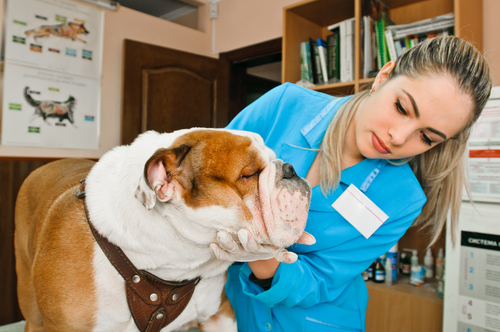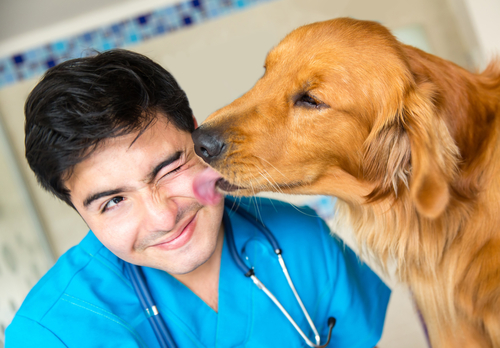Veterinary care is critical to a dog’s well-being. It is also important for an owner to get their questions answered by a qualified professional. When a pup or new dog enters your life, it should be established with a veterinarian.
How often they see a vet depends on the individual dog, but never underestimate the importance of wellness exams.

Wellness Exams vs. Sick Visits
A wellness exam or “check up” is a routine visit where a veterinarian looks the dog over from head-to-toe, listens to the heart and lungs with a stethoscope, and addresses topics such as appetite, exercise, behavior, and breed-specific issues.
They watch the dog’s gait for uniformity and normal movement, check the teeth for dental health, and ask you about diet and appetite. They will also prompt you to bring up any questions or concerns you may have.
Your vet will discuss the importance of vaccinations and flea/tick/heartworm prevention. Based on your discussion, they may perform labwork such as a fecal exam, heartworm test, urinalysis, or baseline bloodwork.
When your dog has a specific medical concern such as an upset stomach or ear infection, your vet will perform a specialized exam focusing on the issue at hand. While they will still listen to the heart and lungs and give your pooch a once-over, the focus of the visit will be getting your dog healthy again.
Note: Just because your dog was seen within the last year for a sick visit does not mean they do not need to come for an annual or bi-annual wellness exam!
The Importance of Semi-Annual Wellness Exams
Dogs age several years, with each passing chronological year. A lot can change during that time. Your dog could develop suspicious lumps or bumps, begin to show subtle signs of arthritis, or develop a serious condition that can only be detected through routine labwork.
Countless dogs (and humans!) have been saved when a doctor caught a life-threatening condition during a routine exam. In humans, it is often early cancers, but in our stoic dogs, it could also be diabetes, thyroid disease, an autoimmune condition, etc.
As with any serious illness, the sooner it is diagnosed, the better chance it can be successfully treated or managed.
How Often A Dog Has A Well Visit Mostly Depends On Age
However, certain breeds are predisposed to health problems and could benefit from semiannual monitoring. Also, if your dog has a history of allergies, orthopedic problems, or other genetic conditions, frequent exams can help keep symptoms under control.
Finally, some dogs have lifestyles that increase their risk of health concerns. Hunting dogs, breeding dogs, certain working dogs, and those who participate in canine sports should be seen at least bi-annually.
Puppies
From a newborn to four months of age, a puppy should be seen by a vet once a month. This is to keep them current on their vaccinations; discuss concerns with their physical development and talk dietary issues. The veterinarian will also watch for signs of highly contagious puppy illnesses such as parvovirus and distemper.
Adult Dogs
Although dogs don’t reach full maturity until the age of two or three, depending on the breed, they can get by visiting the veterinarian once or twice a year from the age of six months on. A healthy adult dog needs a wellness visit to receive certain vaccinations and get their heartworm/flea and tick prevention prescription filled.
If your dog’s breed is prone to genetic conditions, bi- or semi-annual wellness visits are recommended.
Seniors
Smaller breeds reach the geriatric life stage around the age of eight, while larger breeds are considered seniors around the age of six. Wellness exams for seniors should become more frequent, depending on their constitution.
Senior dogs are more prone to developing cancer, arthritis, and a host of other conditions. Regular wellness exams may catch illnesses early, making them easier to treat and offering an older dog a better quality of life.
Even if your dog remains healthy throughout their senior years, regular wellness visits allow your veterinarian to track physical changes and recommend diets, treatments, supplements, and household changes to make life easier for your aging pooch.

Remember: the best person to answer the question “How often should my dog be seeing a vet?” is a vet! If your pup is overdue for a wellness exam, schedule one today!
